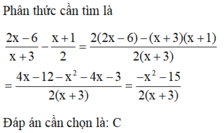

Hãy nhập câu hỏi của bạn vào đây, nếu là tài khoản VIP, bạn sẽ được ưu tiên trả lời.



a) \(\left(x^2+x\right)^2-2\left(x^2+x\right)-15\)
Đặt \(x^2+x=t\), đa thức trở thành : \(t^2-2t-15\)
= \(\left(t+3\right)\left(t-5\right)\)
\(=\left(x^2+x+3\right)\left(x^2+x-5\right)\)
b) \(\left(a+b+c\right)^3-a^3-b^3-c^3\)
\(=a^3+b^3+c^3+2ab+2ac+2bc-a^3-b^3-c^3\)
\(=2ab+2ac+2bc=2\left(ab+ac+bc\right)\)
c) \(x-1+x^{n+3}-x^n\)
\(=x-1+x^n\left(x^3-1\right)\)
\(=x-1+x^n\left(x-1\right)\left(x^2+x+1\right)\)
\(=\left(x-1\right)\left(x^{n+2}+x^{n+1}+x^n+1\right)\)
d) \(2x^4-7x^3-2x^2+13x+6\)
\(=\left(2x^4+2x^3\right)-\left(9x^3+9x^2\right)+\left(7x^2+7x\right)+\left(6x+6\right)\)
\(=\left(x+1\right)\left(2x^3-9x^2+7x+6\right)\)
\(=\left(x+1\right)\left[\left(2x^3+x^2\right)-\left(10x^2+5x\right)+\left(12x+6\right)\right]\)
\(=\left(x+1\right)\left(2x+1\right)\left(x^2-5x+6\right)\)
\(=\left(x+1\right)\left(2x+1\right)\left(x-2\right)\left(x-3\right)\)

bài này đề bài là chứng minh hay là giải bất phương trình vậy bạn

Câu 1:
\(\dfrac{x^2-10x+21}{x^3-7x^2+x-7}=\dfrac{\left(x-7\right)\left(x-3\right)}{\left(x-7\right)\left(x^2+1\right)}=\dfrac{x-3}{x^2+1}\)
\(\dfrac{2x^2-x-15}{2x^3+5x^2+2x+5}=\dfrac{2x^2-6x+5x-15}{\left(2x+5\right)\left(x^2+1\right)}=\dfrac{\left(2x+5\right)\left(x-3\right)}{\left(2x+5\right)\left(x^2+1\right)}=\dfrac{x-3}{x^2+1}\)
Do đó: \(\dfrac{x^2-10x+21}{x^3-7x^2+x-7}=\dfrac{2x^2-x-15}{2x^3+5x^2+2x+5}\)

a, Ta có : \(3\left(x-1\right)-2\left(x+3\right)=-15\)
=> \(3x-3-2x-6=-15\)
=> \(3x-3-2x-6+15=0\)
=> \(x=-6\)
Vậy phương trình có nghiệm là x = -6 .
b, Ta có : \(3\left(x-1\right)+2=3x-1\)
=> \(3x-3+2=3x-1\)
=> \(3x-3+2-3x+1=0\)
=> \(0=0\)
Vậy phương trình có vô số nghiệm .
c, Ta có : \(7\left(2-5x\right)-5=4\left(4-6x\right)\)
=> \(14-35x-5=16-24x\)
=> \(14-35x-5-16+24x=0\)
=> \(-35x+24x=7\)
=> \(x=\frac{-7}{11}\)
Vậy phương trình có nghiệm là \(x=\frac{-7}{11}\) .
Bài 2 :
a, Ta có : \(\frac{x}{30}+\frac{5x-1}{10}=\frac{x-8}{15}-\frac{2x+3}{6}\)
=> \(\frac{x}{30}+\frac{3\left(5x-1\right)}{30}=\frac{2\left(x-8\right)}{30}-\frac{5\left(2x+3\right)}{30}\)
=> \(x+3\left(5x-1\right)=2\left(x-8\right)-5\left(2x+3\right)\)
=> \(x+15x-3=2x-16-10x-15\)
=> \(x+15x-3-2x+16+10x+15=0\)
=> \(24x+28=0\)
=> \(x=\frac{-28}{24}=\frac{-7}{6}\)
Vậy phương trình có nghiệm là \(x=\frac{-7}{6}\) .
b, Ta có : \(\frac{x+4}{5}-x+4=\frac{x}{3}-\frac{x-2}{2}\)
=> \(\frac{6\left(x+4\right)}{30}-\frac{30x}{30}+\frac{120}{30}=\frac{10x}{30}-\frac{15\left(x-2\right)}{30}\)
=> \(6\left(x+4\right)-30x+120=10x-15\left(x-2\right)\)
=> \(6x+24-30x+120=10x-15x+30\)
=> \(6x+24-30x+120-10x+15x-30=0\)
=> \(-19x+114=0\)
=> \(x=\frac{-114}{-19}=6\)
Vậy phương trình có nghiệm là x = 6 .

Bài 5 :
a, Ta có : \(\frac{\left(2x+1\right)^2}{5}-\frac{\left(x-1\right)^2}{3}=\frac{7x^2-14x-5}{15}\)
=> \(\frac{3\left(2x+1\right)^2}{15}-\frac{5\left(x-1\right)^2}{15}=\frac{7x^2-14x-5}{15}\)
=> \(3\left(2x+1\right)^2-5\left(x-1\right)^2=7x^2-14x-5\)
=> \(12x^2+12x+3-5x^2+10x-5-7x^2+14x+5=0\)
=> \(36x+3=0\)
=> \(x=-\frac{1}{12}\)
Vậy phương trình trên có nghiệm là \(S=\left\{-\frac{1}{12}\right\}\)
b, Ta có : \(\frac{7x-1}{6}+2x=\frac{16-x}{5}\)
=> \(\frac{5\left(7x-1\right)}{30}+\frac{60x}{30}=\frac{6\left(16-x\right)}{30}\)
=> \(5\left(7x-1\right)+60x=6\left(16-x\right)\)
=> \(35x-5+60x-96+6x=0\)
=> \(101x-101=0\)
=> \(x=1\)
Vậy phương trình trên có tạp nghiệm là \(S=\left\{1\right\}\)
c, Ta có : \(\frac{\left(x-2\right)^2}{3}-\frac{\left(2x-3\right)\left(2x+3\right)}{8}+\frac{\left(x-4\right)^2}{6}=0\)
=> \(\frac{8\left(x-2\right)^2}{24}-\frac{3\left(2x-3\right)\left(2x+3\right)}{24}+\frac{4\left(x-4\right)^2}{24}=0\)
=> \(8\left(x-2\right)^2-3\left(2x-3\right)\left(2x+3\right)+4\left(x-4\right)^2=0\)
=> \(8\left(x^2-4x+4\right)-3\left(4x^2-9\right)+4\left(x^2-8x+16\right)=0\)
=> \(8x^2-32x+32-12x^2+27+4x^2-32x+64=0\)
=> \(-64x+123=0\)
=> \(x=\frac{123}{64}\)
Vậy phương trình có nghiệm là \(S=\left\{\frac{123}{64}\right\}\)

\(a,\frac{2x+4}{10}+\frac{2-x}{15}=\frac{\left(2x+4\right).3}{10.3}+\frac{\left(2-x\right).2}{15.2}\)
\(=\frac{6x+12}{30}+\frac{4-2x}{30}=\frac{6x+12+4-2x}{30}=\frac{4x+16}{30}\)
\(=\frac{4.\left(x+4\right)}{30}=\frac{2\left(x+4\right)}{15}\)
\(b,\frac{3x}{10}+\frac{2x-1}{15}+\frac{2-x}{20}=\frac{3x.6}{10.6}+\frac{\left(2x-1\right).4}{15.4}+\frac{\left(2-x\right).3}{20.3}\)
\(=\frac{18x}{60}+\frac{8x-4}{60}+\frac{6-3x}{60}=\frac{18x+8x-4+6-3x}{60}=\frac{23x+2}{60}\)
\(c,\frac{x+1}{2x-2}+\frac{x^2+3}{2-2x^2}=\frac{x+1}{2\left(x-1\right)}+\frac{x^2+3}{2\left(1-x^2\right)}=\frac{x+1}{2\left(x-1\right)}+\frac{-x^2-3}{2\left(x^2-1\right)}\)
\(=\frac{x+1}{2\left(x-1\right)}+\frac{-x^2-3}{2\left(x-1\right)\left(x+1\right)}\)\(=\frac{\left(x+1\right)\left(x+1\right)}{2\left(x-1\right)\left(x+1\right)}+\frac{-x^2-3}{2\left(x-1\right)\left(x+1\right)}\)
\(=\frac{x^2+2x+1-x^2-3}{2\left(x-1\right)\left(x+1\right)}=\frac{2x-2}{2\left(x-1\right)\left(x+1\right)}=\frac{2\left(x-1\right)}{2\left(x-1\right)\left(x+1\right)}\)\(=\frac{1}{x+1}\)

a)
\(x^3-7x-6=x^3-x-6x-6\)
\(=x(x^2-1)-6(x+1)\)
\(=x(x-1)(x+1)-6(x+1)=(x+1)[x(x-1)-6]\)
\(=(x+1)(x^2-x-6)=(x+1)[x^2-3x+2x-6]\)
\(=(x+1)[x(x-3)+2(x-3)]=(x+1)(x+2)(x-3)\)
b) \(x^3-6x^2+8x\)
\(=x(x^2-6x+8)\)
\(=x(x^2-4x-2x+8)\)
\(=x[x(x-4)-2(x-4)]=x(x-2)(x-4)\)
c) \(x^4+2x^3-16x^2-2x+15\)
\(=(x^4+2x^3-x^2-2x)-15x^2+15\)
\(=[(x^4-x^2)+(2x^3-2x)]-15(x^2-1)\)
\(=[x^2(x^2-1)+2x(x^2-1)]-15(x^2-1)\)
\(=(x^2-1)(x^2+2x)-15(x^2-1)=(x^2-1)(x^2+2x-15)\)
\(=(x^2-1)(x^2-3x+5x-15)=(x^2-1)[x(x-3)+5(x-3)]\)
\(=(x^2-1)(x+5)(x-3)=(x-1)(x+1)(x+5)(x-3)\)
d)
\(x^3-11x^2+30x=x(x^2-11x+30)\)
\(=x(x^2-5x-6x+30)\)
\(=x[x(x-5)-6(x-5)]=x(x-6)(x-5)\)

b: \(\Leftrightarrow4x^2-8x+4=x^2+2x+1+3\left(x^2+x-6\right)\)
\(\Leftrightarrow3x^2-10x+3=3x^2+3x-18\)
=>-13x=-21
hay x=21/13
c: \(\Leftrightarrow\left(\dfrac{x-90}{10}-1\right)+\left(\dfrac{x-76}{12}-2\right)+\left(\dfrac{x-58}{14}-3\right)+\left(\dfrac{x-36}{16}-4\right)+\left(\dfrac{x-15}{17}-5\right)=0\)
=>x-100=0
hay x=100